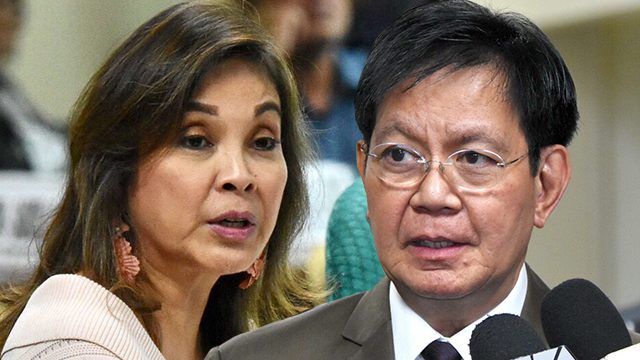SUMMARY
This is AI generated summarization, which may have errors. For context, always refer to the full article.

MANILA, Philippines – Suspecting that the discretionary nature of the Tulong Dunong financial assistance program of the Commission on Higher Education (CHED) was a form of pork barrel, senators decide to realign it instead in the proposed 2019 budget.
Senators Ping Lacson and Loren Legarda proposed to pull out the over P1.9 billion amount for Tulong Dunong and added this to the fund for Universal Access to Quality Tertiary Education Act or the free tuition law, a flagship program of the Duterte Administration.
Lacson and Legarda earlier argued over the implementation of the Tulong Dunong Program during Senate’s budget deliberations Wednesday, December 5.
The CHED’s Tulong Dunong program gives financial aid of about P12,000 every school year to deserving students. The amount covers tuition, cost of living, books, and transportation.
“Isasama na lang yan sa Universal Access to Quality Tertiary Education Act. Ang free tuition act, that’s an expanded Tulong Dunong,” Lacson told reporters on the sidelines of the budget deliberations.
(We will just include it in the Universal Access to Quality Tertiary Education Act. The free tuition act is an expanded Tulong Dunong.)
Under the General Appropriations Bill forwarded to the Senate from the House of Representatives, the Tulong Dunong had a budget of P1.968 billion. This is higher than the P1.93 billion proposed by in the CHED for 2019.
The program was among the CHED’s student financial assistance programs, which were subject to debate in Congress for supposed “cuts” of about P3 billion. (READ: Senators to ensure CHED 2019 budget covers scholars of other programs)
Pork barrel funds? But Lacson wanted the program’s funds deleted because it was “unconstitutional.” To prove this, he presented instances where some lawmakers distributed checks to student beneficiaries, which gave the appearance that they had a say in the implementation of the program.
Because of this, Lacson said the Tulong Dunong program could be considered as pork barrel insertions.
Lacson further argued that such implementation where post-identification of beneficiaries was unlawful and cited the Supreme Court (SC) ruling on the unconstitutionality of the Priority Development Assistance Fund (PDAF) in 2013. Post-identification of beneficiaries means that government officials, example congressmen, have the discretion of selecting who will receive financial assistance.
It’s the discretionary nature of the funds which convinced Lacson that it was a pork barrel.
“If it looks like pork, smells like pork, chops like pork, then it must be pork…. Legislators have no business implementing programs,” he said.
While Legarda agreed that there should be no post-enactment by post-identification of student beneficiaries, she argued stripping the program of its funds would only hurt students who would be in need of the assistance.
“Tulong Dunong is not the creation of a congressman or senator. It is a program of the Commission on Higher Education even while we did not have the free tertiary education law yet…. Hindi masama yung programa. (The program is not bad) In fact, [it is] laudable. Importante lang, sa implementation (What is important is its implementation),” she said.
She added, “It is not simply a cash cow that you can give away.”
A special provision, Legarda said, should instead be placed in the budget to reiterate a strict post-enactment ban through identification of beneficiaries.
Lacson stood his ground, citing a portion of the SC ruling that says, “…unconstitutional means do not justify even commendable ends.”
Proposal: After senators suspended the session to discuss how to proceed, Senate President Pro-Tempore Ralph Recto said he agreed with both Legarda and Lacson. He suggested that a special provision be placed to say that a congressman was allowed to endorse a student for assistance, but that these should be subject to the regulations issued by CHED.
“Since these are allowances to be given to poor students then the CHED would have rules governing this. The endorsement should follow this rules,” he said.
Lacson, though, said “ it cannot be denied” Tulong Dunong was redundant with the free higher education act.
He suggested that the CHED’s budget be augmented, with funds for Tulong Dunong transferred to fund programs of the Universal Access to Quality Tertiary Education Act to be implemented by CHED only.
Recto and Legarda, agreed to the proposal.
With the realignment, the P1.9 billion earlier assigned for Tulong Dunong was transfered to the funds for the free higher education law.
This boosts the allocation of the free higher education law to about P45 billion. The budget was originally pegged at P43 billion in the General Appropriations Bill. – Rappler.com
Add a comment
How does this make you feel?
There are no comments yet. Add your comment to start the conversation.